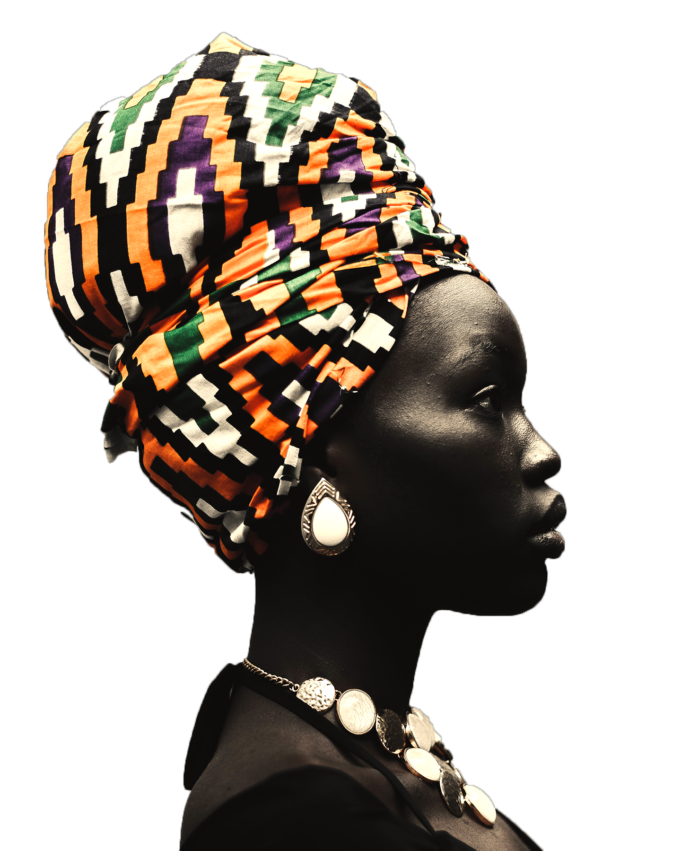by Anisah Muhammad, Nisa Islam Muhammad and Shawntell Muhammad
Black women are wives, mothers, daughters, aunts and nieces. They are also activists, social justice warriors, land developers, business owners, organization leaders, doctors, educators, entertainers, religious and spiritual leaders and more.
The Honorable Elijah Muhammad, Eternal Leader of the Nation of Islam, teaches that a nation can rise no higher than its woman. If the Black community is going to rise, then Black women must rise. For decades Mr. Muhammad’s top student and National Representative, the Honorable Minister Louis Farrakhan, like his teacher, has taught on the limitless power and beauty of women and that they must be uplifted, protected and respected as the second self of God. “Women are rising all over the planet,” Min. Farrakhan has expressed.
The Final Call interviewed Black women from all walks of life involved in different endeavors aimed at uplifting, inspiring and making a difference in communities.
Land development and creating communities
The 19 families under the Black woman-led Freedom Georgia Initiative have been working for almost two years since first purchasing nearly 97 acres of land in August 2020. They are now installing fencing as preparation for farm animals and are renovating a property that will be turned into an Airbnb, said realtor Ashley Scott, one of the initiative’s founders.
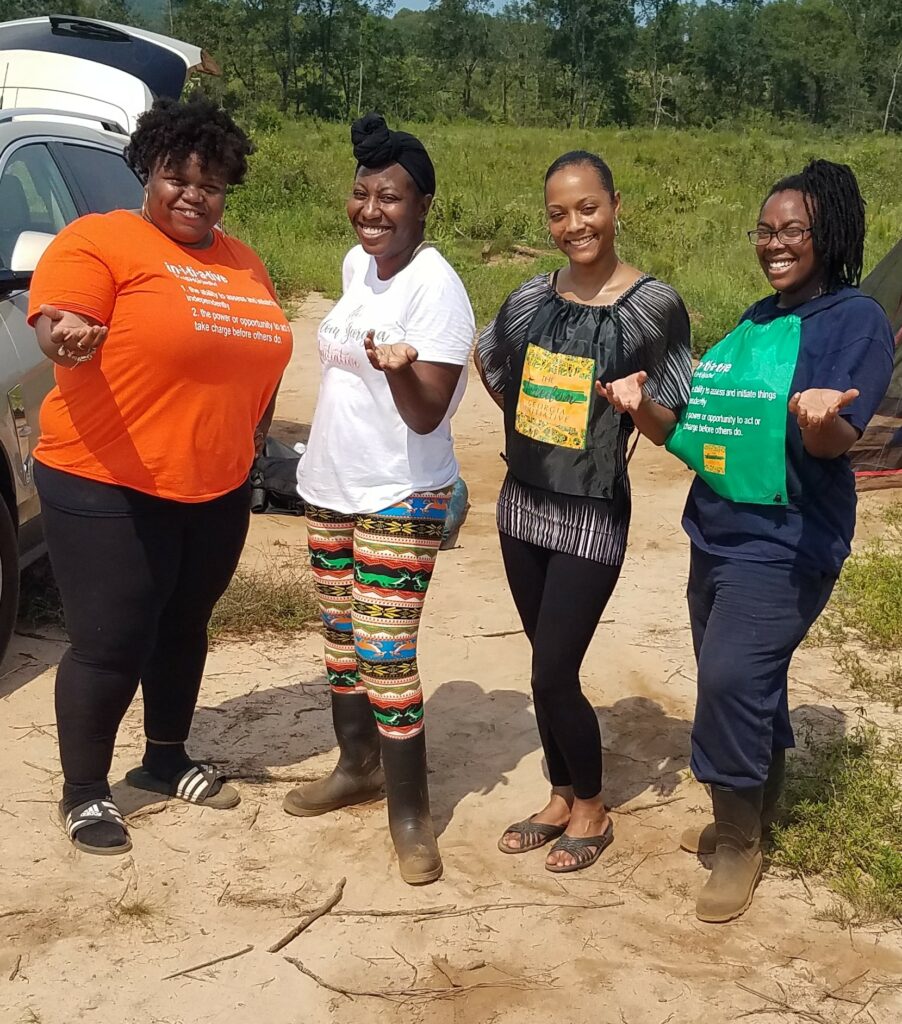
Their main, ongoing challenge has been finding Black people who are qualified and affordable to assist with the project, she told The Final Call. They are currently looking for a Black land surveyor. “Increasing skill sets within minorities and women and veterans so that they can provide the services that are going to be necessary to develop the city is really important,” Ms. Scott stated.
She expressed joy that the project is still going strong. On top of the 97 acres, they acquired 404 acres and are now on the path to acquiring an additional 497 acres that would connect the two parcels they currently have. “That’s the exciting part, that things keep aligning themselves so that this vision of building the city and having this safe haven can actually manifest,” Ms. Scott said.
Her husband being the breadwinner in her home gives her the ability to do the work with Freedom Georgia and lead in the real estate development space. She explained the importance of giving women opportunities and supporting them, because many women may feel “mom guilt” or “wife guilt.”
“If we can support women so that they don’t have to feel that shame, we can acquire more land, we can do more things, and we can feel as if we can succeed without having to compromise or feeling that pain that we sometimes feel when you think about that mom guilt and wife guilt and trying to balance it all,” she said.
Part of Ms. Scott’s advocacy includes access to affordable housing. “To create a community that provides affordable options that are good looking and clean and safe and the types of homes that we all feel worthy of, that’s the kind of community I want to create, so that we have not only just a safe place to live, but a place that can generate wealth for ourselves as a community,” she stated.
Freedom Georgia is getting ready to bring a housing and farming cooperative on the property. Ms. Scott expressed cooperatives are welcome, and she encouraged women to get involved and reach out to different resources such as the Federation of Southern Cooperatives and the BIPOC Intentional Communities Fund.
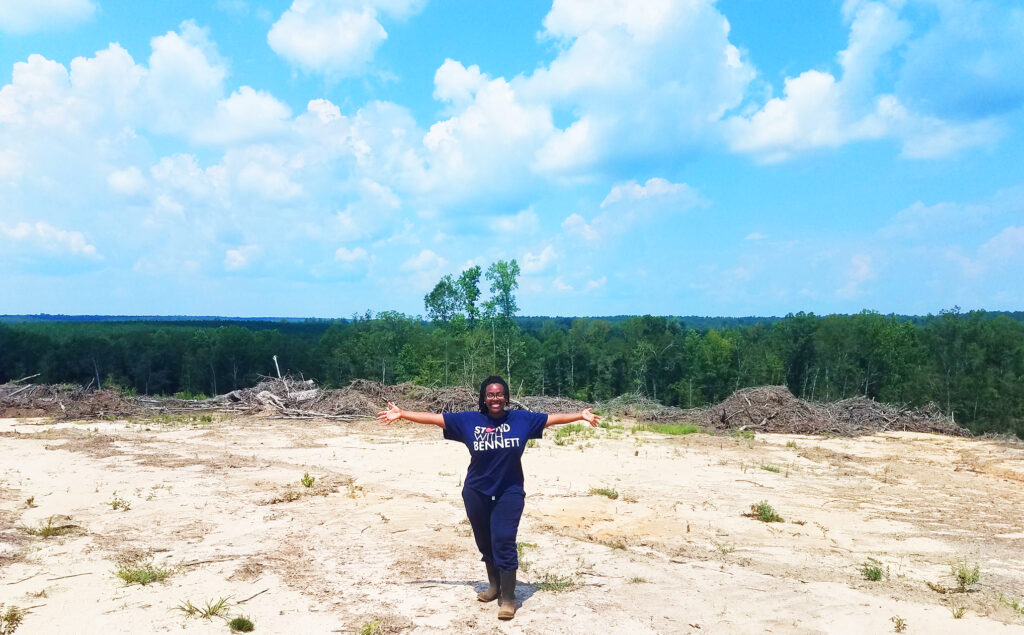
“At the end of the day when you’re talking about creating community. Women are at the center of most communities. We cook the food, we raise the children, we educate the children. So, if women are leading in the space of how we create and design our built communities, then they’ll be more solution-oriented and solutions-based when it comes to meeting society’s needs and the needs of the residents and the people who live in those communities,” she said.
“Which is truly what we want to do as leaders in Freedom. It’s like, what did I need as a mom? What did my mom need as a mom? What does my husband need inside of his community so that he can be and live his best life?” she continued. “We need walking trails. We should have a food garden next door so that I can walk down the street and pick my tomatoes and pick my cucumbers for my garden salad. That’s going to create better health outcomes, and I think women, when we are in a position to lead real estate development, that’s the way we’re thinking. We’re thinking about how to make life better for our families, for our children and for the overall society.”
Melody Muhammad is CEO of Edith Family Farms in Pennsylvania. “I am still learning the value of land and business in particular. Everything that we do from our food, clothing and shelter, it all starts from land ownership,” she said.
“From a Black woman’s perspective … not enough of us are really realizing the value and importance of going back to the basics and striving to get our families to see the value and land and where all the job opportunities really stem from.” Ms. Melody Muhammad sees her value by exposing youth to farming. Every year she runs a summer camp educating youth about agriculture, cooking, and other related skills.

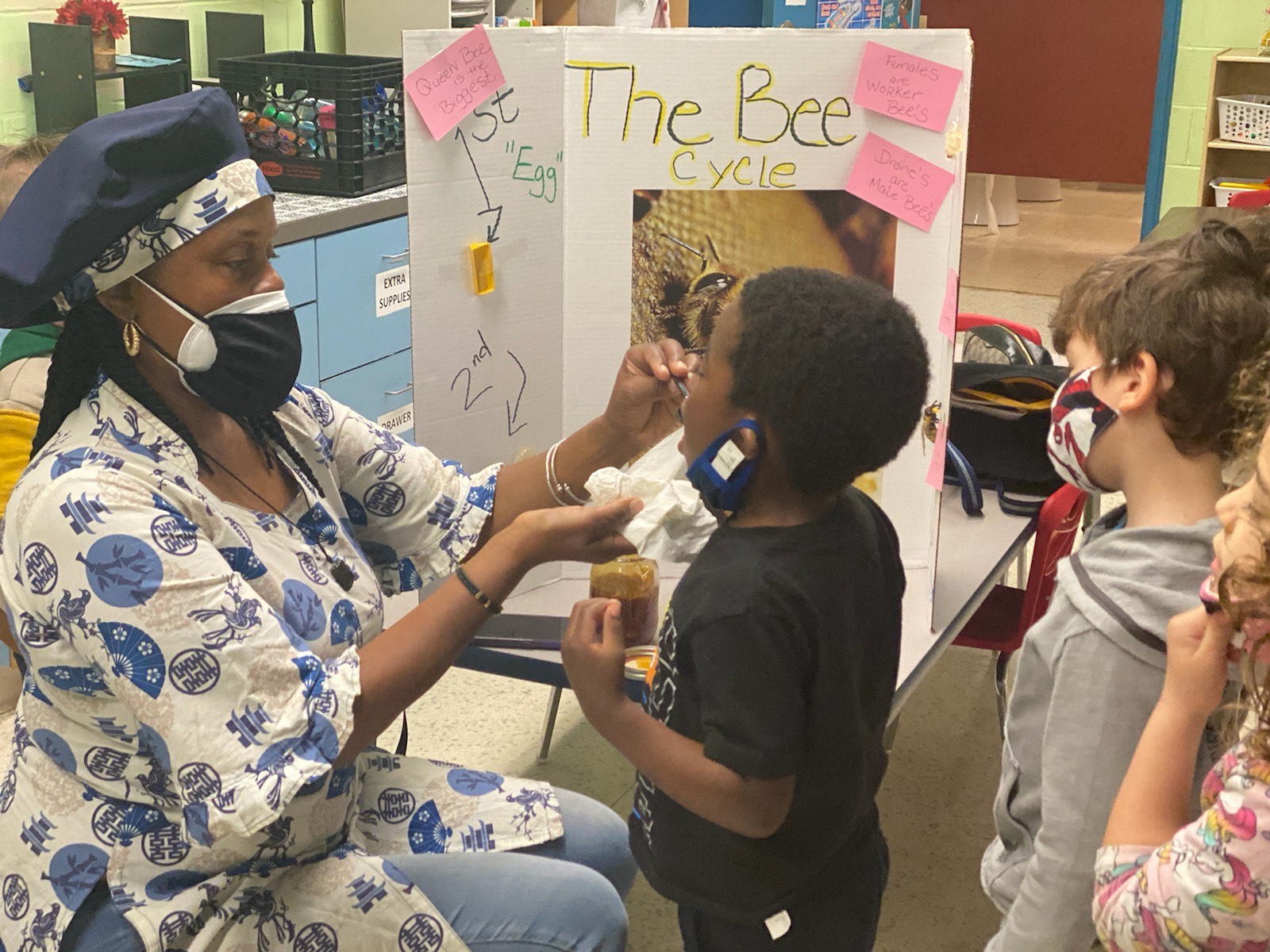
Strictly business
Originally from Central America, Deloyce Dhoruba, a Black Muslim woman, now resides in Grayson, Ga., where she operates Mahogany Brown Candle Co. She pours each candle by hand. Anxiety and panic attacks fueled her desire to launch the business, and she opened shop in 2020 during the pandemic. Her inspiration comes from her grandmother, who taught her to use holistic products, and her children, who have “million-dollar skin” and are allergic to almost everything.
She told The Final Call that aromatherapy products that don’t have additives are hard to find, but with her product, she knows what’s in it. She tests every product six months to a year before putting it on the market.
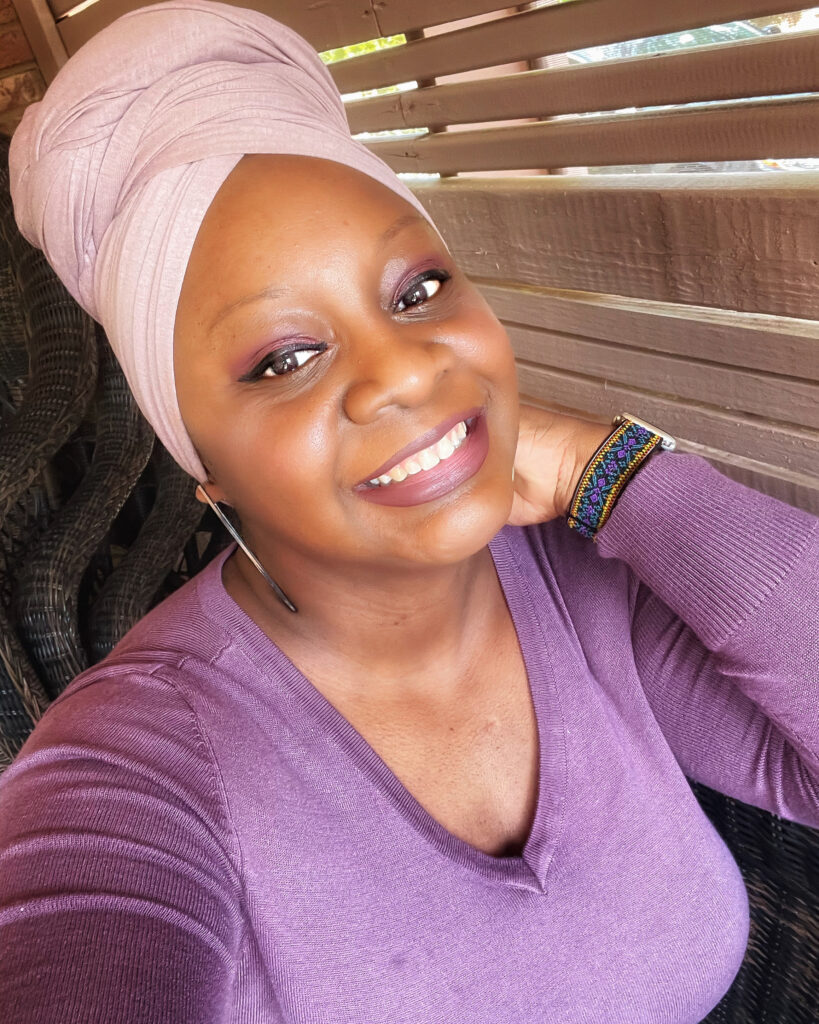
Nubian Simmons, another Black Muslim woman who resides in Milwaukee, Wis., is owner of The Pink Bakery, where she offers allergen-free baking mixes. She’s severely allergic to milk and wheat, and she responds negatively to cross-contamination.
“As you can imagine growing up, being allergic to milk and wheat and being from Wisconsin, when I would eat some of these foods, I would have allergic reactions. So, I developed all types of anxiety. I had an addiction to Pepto Bismol, like I was trying to figure out a way that I can move through the world and not be plagued by what I was born with,” she said to The Final Call.
There were other allergen-free products in stores, but “the stuff that was out there that was made available to me was disgusting,” she expressed. Ms. Simmons felt like she shouldn’t be subjected to this type of food, because she didn’t feel like it was actual food.
“It didn’t taste good. So, I said, you know what, I’m going to learn how to bake myself. I’m going to do this by myself without any culinary experience.”
She learned how to bake without eggs, wheat and milk. She soon found out that the food industry space is saturated with White men, and no one looked like her.
“The biggest challenge that I had to deal with was trying to get respect from people, because they see me, they don’t respect me. Number one, I’m a woman. I don’t know what they saw first, Black or a woman, but whichever one they saw, they weren’t trying to hear either one,” she said.
Ms. Dhoruba and Ms. Simmons are part of an organization called “Buy From A Black Woman,” founded by Atlanta-resident Nikki Porcher.
“Black women find solutions. It’s like, okay, this is a problem, but I can’t just sit in the problem. I can’t just let the problem define who I am. I have to go out and find solutions,” Ms. Porcher said to The Final Call.
The question “why buy from a Black woman” makes her chuckle every time she hears it. Her counter question is, “Why wouldn’t you buy from a Black woman?”
“Everybody knows Black women. Nobody in this world is ignorant to what Black women are doing, and our motto here is when you support a Black woman business owner, you support a whole community. Black women are the stars of the communities,” she said. “Those are the ones who are keeping communities going. They are the unsung heroes, the sung heroes, the ones who wake up early so everybody else can sleep in, the ones who make sure that you have your meal prepared so you can go and do whatever it is you need to do for the day.”
Ms. Simmons pointed out the level of ingenuity Black women have with very little resources. While industry experts have acknowledged Black women as “the fastest growing demographic of entrepreneurs in the U.S.”—with 17 percent of Black women in the process of starting or running a new business, according to a 2021 report by Harvard Business Review—Black women have a disproportionate lack of access to capital.
Black women business owners earn an average revenue of $24,000, compared to $142,900 among all women-owned businesses, according to “The 2019 State of Women-Owned Businesses Report” by American Express.
All three women noted that Black women can overcome the challenges “in spite of.”
“Every resource that they took away from us, every time a door was closed on us or somebody told us no, we still figured out, ‘Oh, there’s a way,’ and there’s a way for several reasons,” Ms. Dhoruba said. “There’s a way because we want it to be a way, there’s a way because we have children that are dependent on us, there’s a way because we know that we are better than what they believe that we are.”
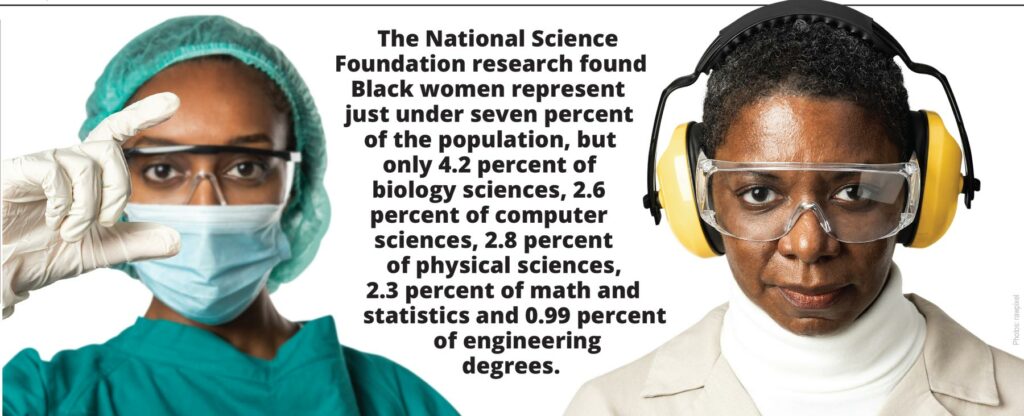
Healing hands
When it comes to education among Black students, according to the Journal of Blacks in Higher Education women and Black women get 64.1 percent of bachelor’s degrees, 71 percent of master’s degrees and 66 percent of doctoral, medical and dental degrees.
The National Science Foundation research found Black women represent just under seven percent of the population, but only 4.2 percent of biology sciences, 2.6 percent of computer sciences, 2.8 percent of physical sciences, 2.3 percent of math and statistics and 0.99 percent of engineering degrees.
Dr. Kamila Muhammad Harris faced challenges in her quest to be a doctor. One thing she had going for her was that her parents always told her she would be a doctor. She was called “Dr. Muhammad” from a young age and wanted to own a hospital. She pursued anesthesia as a specialty because it allowed her to focus on multiple organ systems and have immediate results with her patients.
“For example, a primary care physician, which is extremely vital, will treat your chronic issue and send you home with medication and or whatever lifestyle changes they recommend. They see you again in a few months. In my day-to-day, if someone’s pressure is less than optimal one time, I treat it and I see immediate results. I like that.”
For Black women even deciding to become a doctor can be a hurdle. In many cities they don’t know a Black doctor and have trouble charting a path to success. Many give up before they get started.
“I think the challenges Black women face, if we’re being honest, start early, even before we make it to the field of medicine. Those challenges could be lack of mentorship or just quite frankly, a lack of seeing yourself in this field. I remember being on a plane once and I was sitting next to this young man who happened to be Caucasian. He was reading over my shoulder and discovered we were both in medical school,” she said.
“He commented on how his father, his grandfather, his fiancé, and his brother, they were all physicians. It was just something he knew he’d do. It’s different for us. We have to increase our numbers so that we can see ourselves in the field. That’s the first thing. After that comes an internship. Next are the microaggressions that you incur daily interacting with people who think you are less than. Sometimes the trauma can add up. We have to be self-starters too.”
Dr. Muhammad-Harris has overcome those hurdles and enjoys what she does in New Jersey.
“I love when I can be an advocate for a very nervous patient. I love it when a Black patient feels just that much more comfortable when they see me. I treat every single patient with the absolute best care. I don’t care who they are, what they look like, but it means something to me when my Black patients feel more comfortable. They should have that opportunity.”
Every year in the United States, more than 750 women suffer maternal mortalities, deaths related to pregnancy or childbirth. Black women are 3.5 times more likely to succumb to maternal mortality than White women. Medical racism in hospitals across America has made the birthing experience for Black women a nightmare.
Black babies are four times as likely to die from complications related to low birthweight, compared to White infants. Black mothers were twice as likely to receive late or no prenatal care as compared to White mothers. Black infants had twice the sudden infant death syndrome mortality rate compared to White infants.
Alexis X of Chicago is a Certified Doula. “A Doula is a person who assists a woman during her pregnancy, her labor, and postpartum. In a hospital setting, we advocate for mom, and make sure mom receives what she needs. Racism in maternal health in Illinois does exist, Black women in Illinois are six times more likely to die due to maternal mortality compared to White women,” she said.
“During labor, Black women are not given the option to get in a comfortable position of her choosing; for example, a mom may want to get on her knees, but the staff shuts them down, whereas a White woman can be in any position of her choice,” stated Alexis X.
Star Ali is a Certified Midwife and Certified Doula based in Chicago. “I provide home based prenatal care and deliveries. Home births are just as safe if not safer than hospital births. In the city of Chicago, Black mothers in Illinois are eight times more likely to die from pregnancy related causes than are White mothers,” she said.
When Alexis X is counseling her clients, she advises them to make better food choices, being careful to meet them where they are while encouraging healthy eating. “How to Eat to Live” by the Most Honorable Elijah Muhammad is the source she pulls from to assist her clients. She not only educates them about the navy bean, but she prepares bean soup and gives them to the new mothers.
Good health is vital as Black women are also faced with disproportionately high levels of obesity resulting in health problems that can be addressed through proper diet and exercise.
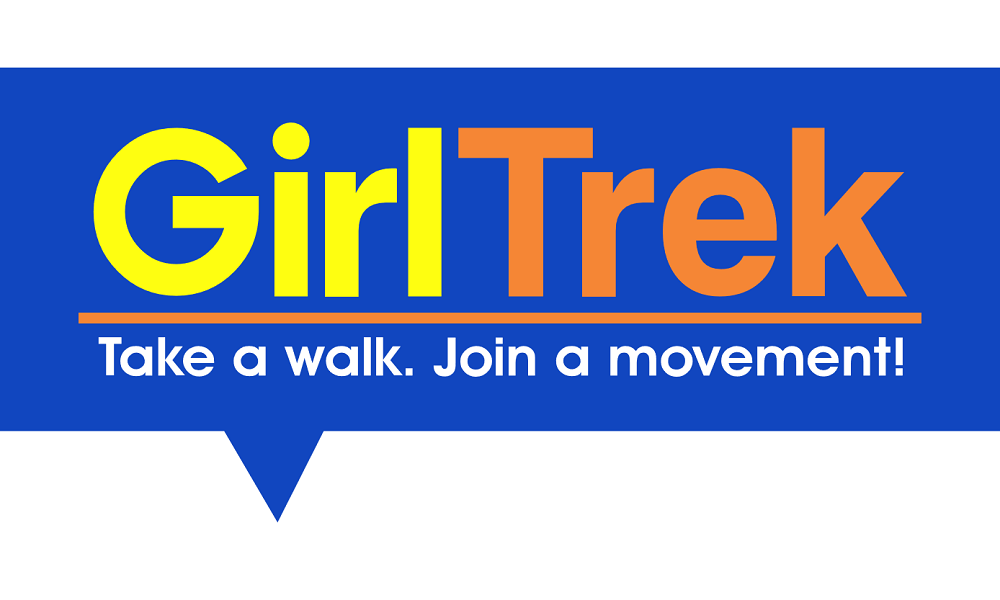
Two friends, Vanessa Garrison and T. Morgan Dixon, founded the organization GirlTrek as part of a Civil-Rights-inspired health movement.
“For almost 10 years, we have been working to build a movement that inspires Black women to reclaim their health, communities and families through the ancestral habit of walking,” Ms. Garrison told The Final Call. “We train women to be organizers across the country, and we produce inspiring content that tells the truth about our circumstances and centers our own joy and healing.”
Ms. Garrison and Ms. Dixon come from communities and families impacted by the health crisis. According to a 2021 study on “Health Equity Among Black Women in the United States,” Black women make up seven percent of the population but suffer disproportionately from infant mortality, maternal mortality, pregnancy-related mortality, hypertension and obesity. Almost five percent of Black women suffer from serious psychological distress, and almost three percent commit suicide.
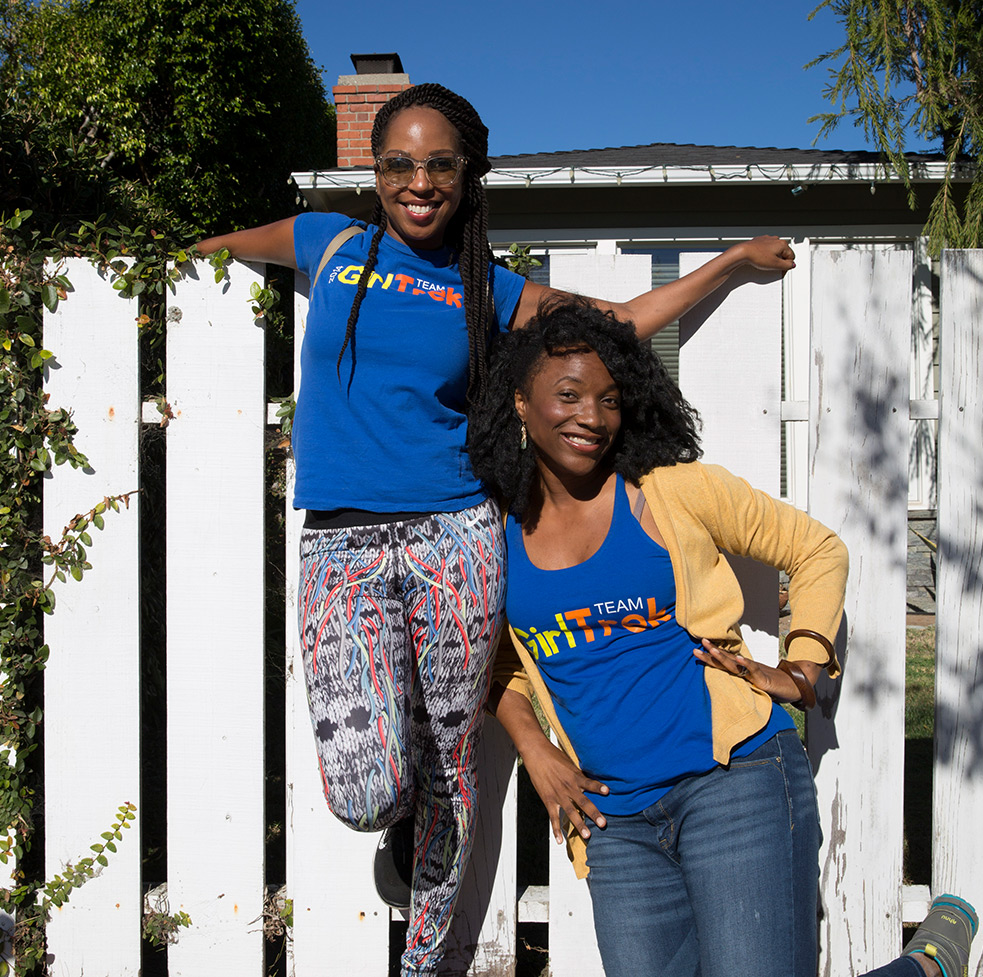
“Racial discrimination is a toxic ‘uncontrollable or unpredictable’ stressor that is associated not only with poor physical health but also with psychological stress,” the report states.
Ms. Garrison calculated the life expectancy of the women in her family to be around 65 years old and steadily dropping. Ms. Dixon, who used to be a classroom teacher, noticed young girls in school showing up lethargic and unsupported with low self-esteem.
“We thought Harriet Tubman walked herself to freedom, we could start walking ourselves to better health,” Ms. Garrison stated.
One of their initial challenges was garnering the trust of Black women. They have since been able to walk with Black women from every walk of life and have reached over one million Black women.
As part of the organization, they have what they call the “three deadly I’s”: isolation, suffering from loneliness; injustice, the systems killing Black women (healthcare, housing, food apartheid, environmental racism); and inactivity, the little to no leisure time and the obesity rates.
Black women’s health is important to address because Black women are dying at higher and faster rates from preventable chronic disease.
“It means that we’re losing our community’s greatest resource. It means that the women who lead social change at the polls, in the corporate space, in our families, in our classrooms, everywhere Black women are embedded, we are dying, and everybody should be concerned about it,” said Ms. Garrison.
“We need to protect Black women so that they can live and thrive,” she added.
“Sisters, what are you capable of doing? The Honorable Elijah Muhammad says a woman can do anything that a man does. And the only thing he forbids the woman to do is the thing that degrades her,” Min. Farrakhan said in a 2015 message titled “Save Our Girls.”
Women can go as high as they want to go, the Muslim leader stated.
“Women: You’ve got to be set free!” he expressed. “What God has put within you must be cultivated, must be developed and must be used for the advancement of a Nation and a world.” Michael Z. Muhammad contributed to this report.
Additional coverage on the challenges, triumphs and work of Black women will be featured in an upcoming edition of The Final Call.
For more information on some of the women and their endeavors profiled in this article, visit: thefreedomgeorgiainitiative.com; mahoganybrowncandleco.com; thepinkbakery.com; www.buyfromablackwoman.org; girltrek.org; holisticbirthcollective.org and contact [email protected].












